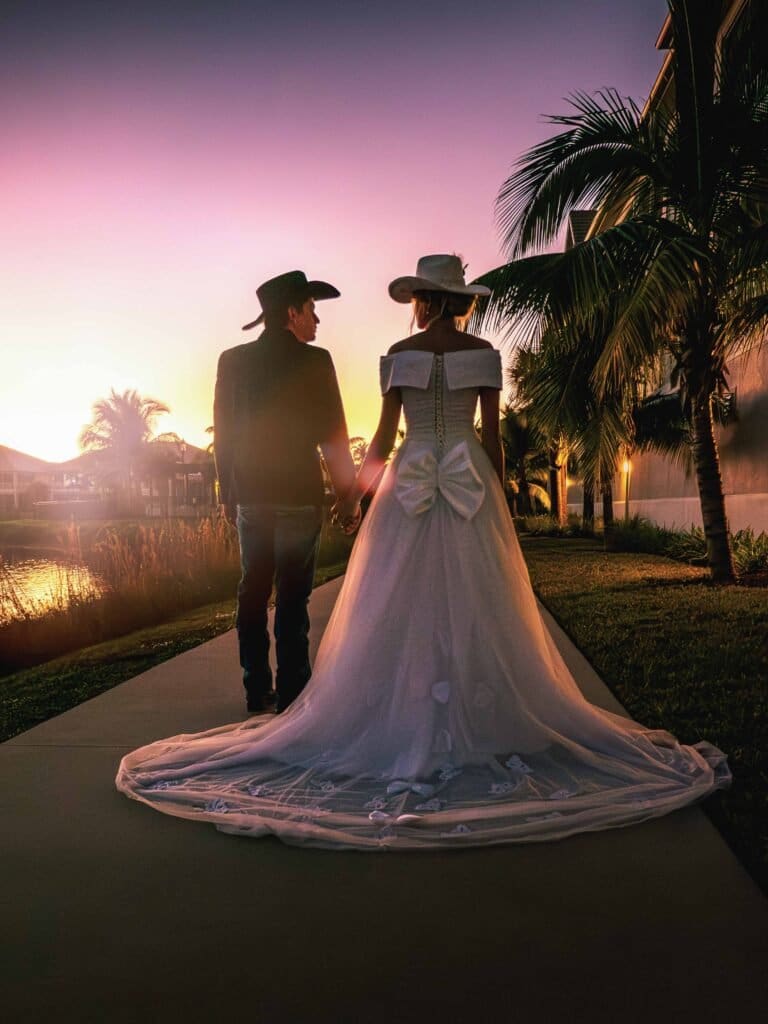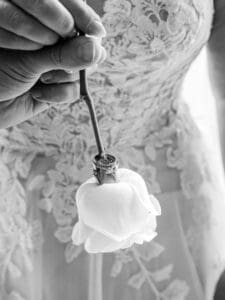Planning a wedding is exciting – but it can also feel overwhelming when you realize how many details go into the big day. You might be asking yourself, “Do we need a wedding planner, or can we handle this on our own?” The answer isn’t one-size-fits-all. Some couples love diving into the planning process, while others feel stressed juggling budgets, vendors, and timelines. In this guide, we’ll walk you through the pros and cons of hiring a professional wedding planner versus planning the wedding yourself. By the end, you’ll have a clearer idea of which path suits your style, budget, and needs.
A dedicated wedding planner book (complete with engagement rings) symbolizes the organization and attention to detail that goes into planning a wedding. Hiring a planner can bring peace of mind, while going solo can be rewarding if you’re prepared for the challenge.
The Case for Hiring a Wedding Planner (Pros)
Expert Guidance and Experience: Professional wedding planners plan weddings for a living, which means they’ve seen it all – tricky family dynamics, weather emergencies, last-minute vendor cancellations – and know how to handle it. Their experience can save you from common pitfalls. They also come equipped with insider knowledge: Which florist is reliable? How much should a DJ cost? Planners have the answers at their fingertips. This expertise can save you countless hours of research and potential mistakes. Think of a planner as a knowledgeable coach who’s orchestrated many “I do” moments before and can guide you smoothly to yours.
Less Stress, More Enjoyment: One of the biggest reasons couples hire a planner is to reduce stress. With a planner managing the logistics, you’re free to enjoy being engaged and excited about your wedding, rather than worrying if you remembered to confirm the cake delivery. On the wedding day, a planner handles any hiccups so you and your partner can be fully present. Instead of fielding calls from vendors or figuring out why the centerpieces haven’t arrived, you could be sipping champagne and soaking in every special moment. Many couples say having a planner allowed them to actually enjoy their wedding day without running around troubleshooting.
Vendor Connections and Discounts: Established planners have a network of vetted vendors – photographers, caterers, DJs, florists – and often get insider pricing or perks for bringing in business. They might snag you a discount or extra dessert tray, which can help offset some of the planner’s fee. More importantly, they’ll recommend vendors known for quality and reliability. Finding trustworthy vendors on your own can be like searching for a needle in a haystack of online reviews. A planner gives you a shortcut to the best team for your wedding. Plus, they can often negotiate contracts on your behalf, ensuring you get fair terms and that nothing important is overlooked.
Time Savings: Planning a wedding can feel like a part-time job. If you and your fiancé are busy with work or other commitments, dedicating 10+ hours a week to wedding emails and appointments can be tough. A planner handles the heavy lifting – creating schedules, managing RSVPs, coordinating with vendors – which frees up your time. Instead of spending your evenings comparing venue packages or designing a floor plan, you can focus on fun stuff (like cake tastings!) while your planner tackles the tedious tasks and keeps everything on track.
Creative Vision and Design: If you have a general idea of the atmosphere you want (e.g. “rustic romantic” or “modern glam”) but aren’t sure how to bring it to life, a planner can help. Many wedding planners are skilled designers who can translate your vision into reality – choosing cohesive color palettes, suggesting decor elements, and ensuring the overall look wows you and your guests. They can prevent design mishaps, too (like clashing colors or décor that doesn’t fit the venue space). With a planner’s creative input, your wedding can look like those dreamy Pinterest inspiration boards, but tailored to you.
The Case for DIY Wedding Planning (Cons of a Planner / Pros of Going Solo)
Budget Considerations: Wedding planners are an added expense, and for couples on a tight budget, that cost can be hard to justify. Full-service planners often charge a flat fee or a percentage of the wedding budget. If your wedding budget is modest, you might prefer to allocate those funds to other priorities – like an open bar or your honeymoon. Planning on your own can indeed save you the fee a planner would charge. For some couples, that’s money better spent on extra guests or a videographer. (Tip: If cost is a concern but you still want some help, consider a “month-of” or “day-of” coordinator rather than a full planner. That way, you get professional help for the crunch time and actual wedding day at a lower cost.)
Personal Enjoyment: Surprising as it may sound, not everyone finds wedding planning stressful – some actually enjoy it! If you love organization, detail-crafting, and making lots of little decisions, you might relish the process. Planning together as a couple can be a bonding experience: visiting venues on weekends, DIY-ing centerpieces with friends, curating the playlist for the reception. By taking the reins yourselves, you retain complete creative control. Many couples find it deeply rewarding to see an event they planned from scratch come together beautifully on wedding day. It can truly make the wedding feel personal and unique to your style, since you oversaw each detail.
Control and Vision: Hiring a planner means trusting someone else with big decisions. If you’re particular about details, you might feel more comfortable keeping full control. When you plan solo, you don’t have to compromise on your vision or communicate every idea – you’re in charge. Couples who have a very specific image of their wedding (and perhaps strong opinions on everything from napkin colors to music setlists) might prefer not to filter those decisions through a planner. Going DIY allows you to be as meticulous as you want. Just remember to also be realistic about what you can handle – control is great, but only if you have the bandwidth to manage it all.
Flexibility and Informality: Without a planner, you can make the planning process as formal or informal as you like. There’s no need to schedule meetings to update someone else; you can have a planning “meeting” in PJs on the couch on Sunday morning. Some couples appreciate this flexibility and the lack of pressure to “report” to a planner. You can also change your mind on details without worrying about coordinating with another person’s schedule. Essentially, you answer only to yourselves. If your wedding is small or not overly complex, you might find that a planner isn’t necessary and that a few checklists (see our Ultimate Wedding Planning Checklist in another post) and organized spreadsheets do the trick.
Making the Decision: Which Path is Right for You?
Every couple’s situation is different, so ask yourselves a few key questions to decide if you need a planner:
- What’s your budget? If you have some cushion, a planner can be a worthwhile investment in peace of mind. If things are tight, you might opt to DIY or choose a less expensive coordination service.
- How much time do you have? Consider your work schedules and personal commitments. If you’re both swamped, a planner will save you time and stress. If you have flexible schedules or a long engagement, you may manage fine on your own.
- Do you enjoy planning and details? If one of you is a natural organizer or you’ve been scrapbooking wedding ideas for years, you might thrive doing it yourself. If it already sounds daunting or you’re not detail-oriented, a planner could be a lifesaver.
- What is the scale and complexity of your wedding? Large guest list, multiple-day events, or complex logistics (like shuttling guests, managing cultural ceremonies, etc.) often warrant a planner. A simple backyard wedding with 30 guests might not. More moving parts = more value in having a pro coordinate them.
- Are friends and family helping? Sometimes a trusted family member or friend with event experience can act as a pseudo-planner for free. Just be cautious: you don’t want to strain relationships or rely too heavily on someone who’s also a guest. They deserve to enjoy the day too!
Consider doing a bit of both: Many couples handle the early planning themselves (choosing venue, style, maybe booking major vendors) and then hire a wedding planner for the final month or day-of coordination. This hybrid approach can give you the best of both worlds – you save money by doing a lot yourselves, but you have a pro to tie up loose ends and run the show when it matters most.
The Bottom Line
Hiring a wedding planner is a personal decision that comes down to your circumstances and priorities. If you crave guidance, relief from stress, and a seasoned expert on your team, a planner could be your best investment. If you’re budget-conscious, love planning, or have a very intimate celebration in mind, you might confidently go without. Remember, the goal is to enjoy your wedding journey. Whether that means getting professional help or tackling it together as a couple, choose the path that lets you savor the excitement of planning as well as the joy of the big day.
No matter what you decide, a little preparation goes a long way. If you do go DIY, arm yourself with resources (our blog has plenty of tips, like the 10 Wedding Planning Mistakes to Avoid). And if you work with a planner, communicate your vision clearly so you’re always on the same page.





